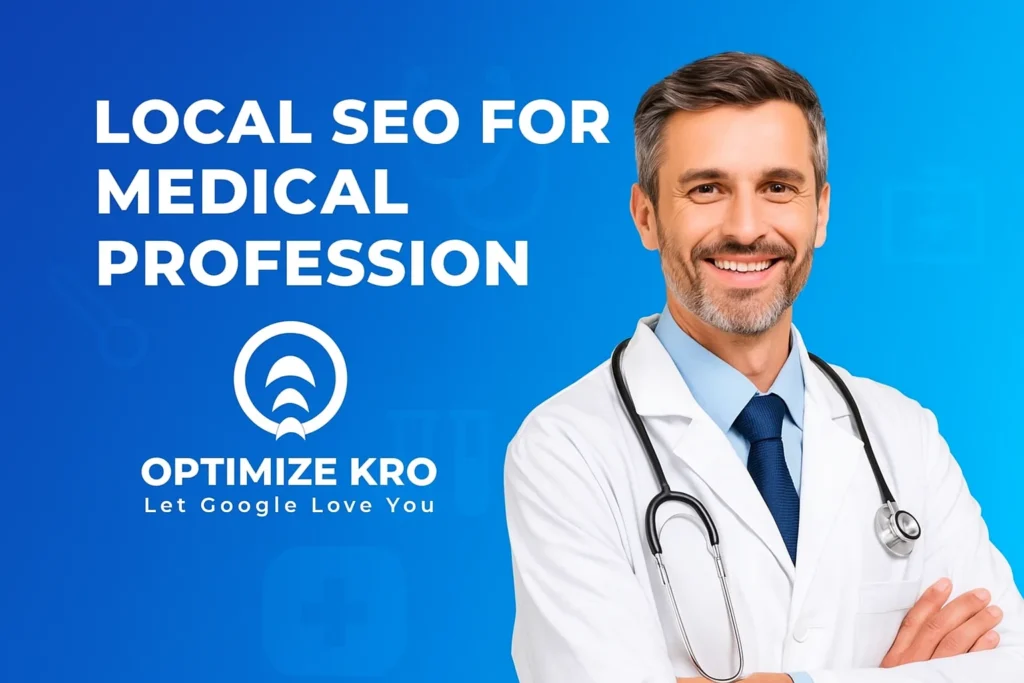In the digital age, medical professionals cannot afford to ignore the power of the internet. Whether you’re a private practice owner, a dentist, or a specialist, an online presence is essential to attract new patients and stay competitive. Local SEO (Search Engine Optimization) has emerged as a crucial strategy for healthcare providers, as it ensures that your practice is visible to local patients searching for medical services in your area.
In this comprehensive guide, we will explore the importance of local SEO for medical professionals and provide actionable insights and strategies for optimizing your website, Google My Business profile, and other online platforms to increase visibility, drive traffic, and convert leads into patients.
- What is Local SEO for Medical Professionals?
- Why Local SEO Matters for Medical Practices
- Key Elements of Local SEO for Healthcare Providers
- The Role of Reviews and Ratings in Local SEO
- Content Marketing and Blogging for Medical Professionals
- Social Media for Local SEO
- Mobile Optimization for Local SEO
- What Our Clients Say
- Tracking and Measuring Local SEO Success
- Common Mistakes to Avoid in Local SEO for Medical Practices
- FAQs
- Conclusion

What is Local SEO for Medical Professionals?
Local SEO refers to the process of optimizing your online presence to appear in search results for location-based queries. For medical professionals, local SEO helps them get found by potential patients who are actively searching for healthcare services in their geographical area. These searches often include terms like “dentist near me,” “pediatrician in [city],” or “emergency care near me.”
By leveraging local SEO techniques, you can ensure that your practice ranks higher in local search results, increasing your chances of being noticed by those who need your services the most. Local SEO is a critical tool to improve visibility, drive foot traffic, and ultimately grow your medical practice.
Why Local SEO Matters for Medical Practices
As a healthcare professional, your primary goal is to connect with patients who require your services. With more people using search engines like Google to find healthcare providers nearby, a strong local SEO strategy ensures that your practice shows up when they search for relevant terms. Here are several reasons why local SEO is crucial for medical practices:
- Increased Visibility: A well-optimized medical website can rank higher in search engine results, leading to greater visibility and exposure to potential patients.
- Targeted Traffic: Local SEO helps you attract relevant visitors who are looking for healthcare services in your area. These are people who are ready to convert into patients.
- Higher Conversion Rates: Local search queries typically indicate a higher level of intent. People searching for healthcare services in their area are likely to make an appointment or visit your practice.
- Competitive Advantage: Many medical professionals still overlook the importance of local SEO. By adopting this strategy, you can gain an edge over competitors who may not be optimizing their online presence.
Key Elements of Local SEO for Healthcare Providers
Effective local SEO for medical professionals is made up of several key components. Below are some of the most important elements to focus on when optimizing your medical practice for local search:
3.1 Optimizing Google My Business (GMB)
Google My Business (GMB) is one of the most powerful tools for local SEO. It allows medical professionals to control how their practice appears in Google search results and Google Maps. Here’s how you can optimize your GMB profile:
- Claim and Verify Your GMB Listing: If you haven’t already, claim your GMB listing and go through the verification process to confirm that your practice is legitimate.
- Complete Your Profile: Fill out all sections of your GMB profile, including your business name, address, phone number, website, hours of operation, and categories (e.g., doctor, dentist, pediatrician). Make sure this information is consistent across all platforms.
- Add High-Quality Photos: Upload high-resolution images of your practice, staff, office, and facilities. Photos help build trust and encourage potential patients to visit your office.
- Encourage Reviews: Ask satisfied patients to leave reviews on your GMB profile. Positive reviews not only improve your online reputation but also contribute to your local rankings.
- Use Posts and Updates: Regularly post updates, offers, and news on your GMB profile to keep your practice engaged with current and potential patients.
3.2 On-Page SEO: Optimizing Your Website for Local Search
Your website is the foundation of your online presence, and optimizing it for local SEO is critical for attracting patients. Focus on the following on-page SEO strategies:
- Optimize for Local Keywords: Incorporate location-based keywords on your website. For example, instead of just using “dentist,” try “dentist in [your city].” Use these keywords in titles, meta descriptions, headers, and throughout the content.
- Create Local Landing Pages: If your practice has multiple locations, create separate landing pages for each location with localized content. Include unique content about each location and target local keywords.
- Add Your NAP (Name, Address, Phone) Information: Ensure that your practice’s NAP details are clearly visible on your website, preferably in the header or footer. This information should match your GMB listing.
- Mobile Optimization: Make sure your website is mobile-friendly. A significant number of patients search for healthcare providers on their mobile devices, so a responsive, fast-loading website is essential.
3.3 Local Citations: Building Your Online Presence
Local citations refer to mentions of your practice’s name, address, and phone number (NAP) on external websites, such as directories, review sites, and other local listings. These citations play an important role in boosting your local SEO rankings. To get started:
- Submit Your Practice to Local Directories: Ensure your practice is listed on reputable local directories such as Yelp, Healthgrades, ZocDoc, and others.
- Consistency is Key: Make sure your NAP information is consistent across all citations. Discrepancies can harm your local rankings.
- Use Schema Markup: Implementing schema markup (structured data) on your website can help search engines understand your business details, further enhancing your local SEO.
The Role of Reviews and Ratings in Local SEO
Online reviews are a significant ranking factor for local SEO. Positive reviews can increase your practice’s visibility and credibility, while negative reviews can drive potential patients away. Here’s how you can leverage reviews to improve your local SEO:
- Ask for Reviews: Encourage your patients to leave reviews on Google, Yelp, and other review platforms. Offer easy ways to leave reviews, such as through follow-up emails or text messages.
- Respond to Reviews: Respond to both positive and negative reviews promptly and professionally. Address any concerns or issues that arise to show that you care about patient satisfaction.
- Maintain a High Rating: A high average rating (4 stars or more) can increase your chances of ranking higher in local search results.
Content Marketing and Blogging for Medical Professionals
Content marketing is an essential part of local SEO for medical professionals. Blogging and publishing high-quality content can help position your practice as an authority in your field, while also attracting patients. Here’s how to use content marketing effectively:
- Create Localized Content: Write blog posts that address local health issues, news, and events. For example, a pediatrician could write about the latest vaccination guidelines for children in their area.
- Answer Common Patient Questions: Use your blog to answer frequently asked questions about your services, treatments, or common health concerns. This can help build trust with potential patients.
- Include Local Keywords: Use location-specific keywords in your blog posts to help improve your rankings for local searches.
Social Media for Local SEO
While social media doesn’t directly affect local SEO rankings, it can influence local search results by increasing engagement and driving traffic to your website. Be sure to:
- Maintain Active Social Media Profiles: Create profiles on platforms like Facebook, Instagram, LinkedIn, and Twitter. Share content regularly, including local news, patient testimonials, and tips related to your healthcare services.
- Engage with the Local Community: Participate in local events, sponsor community activities, or host health-related workshops to improve your visibility in the local area.
- Promote Reviews: Share positive reviews on your social media profiles to build credibility and trust.
Mobile Optimization for Local SEO
A large number of local searches are performed on mobile devices, so it’s essential to ensure your website is mobile-friendly. A mobile-optimized website is faster, easier to navigate, and more likely to convert visitors into patients.
- Responsive Design: Ensure that your website design is responsive, meaning it automatically adjusts to fit any screen size, from smartphones to tablets.
- Page Speed: Mobile users expect fast-loading pages. Optimize your website’s load time by compressing images, leveraging browser caching, and minimizing code.
What Our Clients Say
Trusted by contractors and local businesses for proven Local SEO Services.
John M. – General Contractor
“These guys transformed my Google Maps ranking. More calls, more local leads, and better visibility!”
Sarah L. – Roofing Business
“Within 3 months, my business went from page 3 to the top 3 listings. Highly recommend their Local SEO service!”
David K. – Plumbing Services
“Affordable and effective SEO. My local service calls doubled in less than 90 days.”
Tracking and Measuring Local SEO Success
To ensure that your local SEO efforts are effective, you need to track and measure your progress. Use tools like Google Analytics, Google Search Console, and third-party SEO tools to monitor your rankings, website traffic, and user behavior.
- Track Keyword Rankings: Monitor how well your practice is ranking for local keywords. Adjust your content strategy if necessary.
- Monitor Local Reviews: Keep track of the number and quality of reviews your practice receives. Positive reviews can improve your rankings and online reputation.
- Analyze Website Traffic: Check how many visitors your website is receiving from local searches and what pages they are visiting.
Common Mistakes to Avoid in Local SEO for Medical Practices
- Ignoring Online Reviews: Reviews are a major ranking factor, so ignoring them can hurt your local SEO efforts.
- Inconsistent NAP Information: Ensure that your practice’s NAP details are consistent across all platforms and directories.
- Overlooking Mobile Optimization: A mobile-optimized website is essential for attracting local patients who search on their phones.
FAQs
Q: How long does it take to see results from local SEO?
A: It typically takes about 3-6 months to see significant improvements in local SEO rankings. However, this can vary depending on the level of competition and how well you implement SEO strategies.
Q: Can I do local SEO myself, or should I hire an expert?
A: While you can implement some local SEO strategies yourself, hiring an SEO expert or agency with experience in the healthcare industry can help you get the best results faster.
Q: Is Google My Business the most important factor in local SEO?
A: Google My Business is one of the most important factors, but it’s just one piece of the local SEO puzzle. Other factors, such as on-page SEO, reviews, and local citations, also play a critical role.
Conclusion
Local SEO is an indispensable tool for medical professionals looking to attract new patients and grow their practices. By optimizing your online presence, including your website, Google My Business profile, and local citations, you can significantly improve your chances of being found by local patients in need of your services. Stay consistent with your efforts, track your progress, and continuously improve your strategies to maintain a competitive edge in the ever-evolving world of local SEO.

Gulfam Qamar is a seasoned Local SEO expert with a proven track record of helping businesses boost their online visibility and dominate local search results. With deep expertise in Google Business Profiles, on-page optimization, and local citation strategies, Gulfam helps brands connect with nearby customers and grow sustainably. When he’s not optimizing websites, he’s sharing actionable SEO tips and insights to empower small businesses in the digital space.

